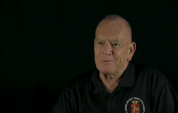5:11 | How did that interview with Air America go? Aviator Larry Taylor got the job, but he found out when he got to Thailand that he'd been lied to about his interest in flying T-28's. He was satisfied flying helicopters, though, and since he was a civilian, he actually got some time off every month.
Keywords : Larry S. Taylor helicopter pilot Air America North American T-28 Trojan Beechcraft Model 18 (C-45) Thailand Taipei Taiwan Bangkok Udorn Royal Thai Air Force Base Laos Vientiane

Beer and ball games. That's what retired Marine Corps General and former Air America pilot Larry Taylor enjoys these days. He remains involved in various activities related to his service and has a ready lesson available for civic groups who ask him to speak. It can be summed up as "the troops eat first."
Marine aviator Larry Taylor valued his stint with a ground unit as a liaison officer, but he was intrigued by this civilian outfit, Air America. It was an open secret that it was an intelligence operation supporting friendly locals in Southeast Asia. It could be mundane supply and refugee flights or it could be dangerous insertions on the Ho Chi Minh Trail.
Air America pilot Larry Taylor flew the Sikorsky H-34, the same aircraft he'd flown in the Marines. It could take a lot of punishment and keep on flying, which was something he really loved. Official policy was that the civilian pilots could not carry weapons, but in a war zone, that policy was fairly flexible.
Air America aviator Larry Taylor was operating near a secret communications site when he heard on the radio that an A-1 Skyraider pilot was bailing out. He flew his helicopter to the area and was waiting when the parachute came down. It would be years before he learned the name of the rescued pilot.
One type of mission for Air America pilots was support for CIA operatives embedded with local tribes, particularly the Hmong. A lot of the action was near the Ho Chi Minh trail and the lesser known Sihanouk Trail, which was where pilot Larry Taylor had his helicopter shot up by ground fire.
Air America pilot Larry Taylor speaks of his encounters with the legendary Anthony Poshepny, a.k.a. Tony Poe. Poe was a CIA operative living with the Hmnog tribe in a remote area of Laos. He had married a local woman and was considered indispensable to the clandestine campaign to aid the indigenous people.
In his 20 months with Air America, pilot Larry Taylor never heard the initials "CIA" spoken. He and his colleagues were never under any misconception, though, about who they were working for. He dismisses the accusation that Air America was involved in smuggling heroin on the side.
Did he have to keep a low profile in Thailand as a civilian working for Air America? Larry Taylor says no, he just went about his day. He had a Thai girlfriend and enjoyed dinners with her family.
Air America pilot Larry Taylor went with a pal from the Army to Vung Tau for a little R&R. There was just one problem. It was the end of January 1968 and the Tet New Year celebrations were about to begin. As soon as they arrived in Vung Tau, they immediately began hearing rumors of attacks. It was about to get real stressful.
After his time with Air America, Larry Taylor returned home and did two things, joined the Marine Corps Reserve and tried to find that sweet airline job. He finally got the job and concurrently rose through the ranks of the Marines. He would even have some active duty left in him in the aftermath of the 9/11 attacks.
He was in a platoon leaders course when he looked up from the mud and wondered if he could get into flight school. Larry Taylor made good on that desire and became a helicopter pilot. During an early shipboard cruise, the unit was dispatched to the Panama Canal Zone to stop rioting.
As a Marine helicopter pilot during the Cold War, Larry Taylor participated first in hurricane relief in Haiti, and then got a taste of action in the Dominican Republic.
After all his military commitments, retired Marine General Larry Taylor went to Iraq to run a program for a civilian contractor. It was post Surge and more uncomfortable than dangerous. His biggest problem was not the enemy. It was the State Department bureaucracy.
The number one mission of the Marine Corps Reserve is to be ready to go to war. Having risen through the ranks of reserve officers, Larry Taylor knew it would pay off, and it did with all the recent wars. When the 9/11 attacks occurred, he was at a meeting in Washington and could only watch from the roof as the Pentagon burned.
When he was recalled to active duty after the 9/11 attacks, General Larry Taylor insisted that he also get the newly required martial arts training that all Marine were supposed to have. One of his duties overseeing mobilization readiness was to pacify reserve units who were anxious to fight, but not yet sent into battle.